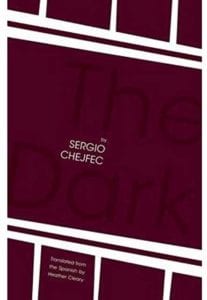
Sergio Chejfec’s The Planets was a finalist for the 2013 Best Translated Book Award. The latest of his books translated into English, The Dark further reveals Chejfec’s brilliant, inventive writing. Originally from Argentina, Chejfec teaches Creative Writing in Spanish at NYU.
Shelf Unbound: The narrator is obsessed with a young female factory worker, and everything we know of her is filtered through his warped
view of her. How did you go about giving the reader a close glimpse of these characters while actually revealing very little about them?
Sergio Chejfec: The story’s narrator finds inspiration in the mystery zone between what he knows and what he does not know: He loves the girl because she is a factory worker and because, while being a factory worker, she has a unique subjectivity. As a factory worker she cannot have the psychological attributes literary characters usually pre-
sent. She belongs to another culture. Maybe that is why the narrator knows too much and too little at the same time.
Shelf: “Like dust in an empty room, these layers settle uniformly and without hurry …” This line in The Dark well describes your writing style: You have almost no plot and without hurry build the story layer upon layer. Did you build the story sparely from the start or did you pare it down in the editing process?
Chejfec: In reality I give the same importance to the first draft as to subsequent ones. Sometimes I believe my novels are built basically from my effort to get away from the first draft, something incomplete or inaccurate. In my case, the versions advance and expand as I go about the editing process.
Shelf: In an interview in Guernica, you said, “Literature needs to be a machine of illusions.” What did you mean by that?
Chejfec: Almost all stories are presented as a natural and obvious outpouring of the real world, but they are not. I believe they should be presented as visions of the world, although partial, and as barely hypnotizing effects. When I say “machine” I mean that the novel only appears as an artificial organization of words, actions and arguments that because of its artificial character is able to talk about things more eloquently than the narrations that are seeking to erase the distance between what is said and what is apparently real.
Shelf: Being diminished or not fully seen is a theme in the novel. For example, you write of Delia: “She had a special capacity for imparting an overabundance of being; not a longer life, but rather a more emphatic presence. This quality, by a predictable mechanism of compensation, tended to distance her, dilute her, and make her nearly
transparent, like I’ve said, just as happened every day when she took her place at the machines.” What drew you to this theme?
Chejfec: The narrator is observant and analytical. He feels attraction to what is different and what he cannot understand. He likes to plot hypothesis, but not clarify mysteries. This novel is a small testimonial to the working class, so forgotten in spite of sustaining the world. It seemed honest to assume a non-paternal view—contrary to what the social or testimonial literature usually has—and try to describe that world as if it were about epitomes, through a moral digression that is at the same time anthropological.
Shelf: What did you learn about this novel or about your writing in the process of having it translated into English?
Chejfec: I feel very fortunate in trusting the criteria and decisions of Heather Cleary and Margaret Carson (they have translated my books). Sometimes, during a translation a question makes me review phrases or paragraphs in the original version, and almost always I discover I have not been very clear. I have the impression that every writer has the privilege of being more or less ambiguous (not many take advantage of it). But that privilege does not permeate to foreign languages. Therefore, you have to pay a price; the price is translation, and the translator is the only one capable of permeating that privilege. Otherwise, the review of the works to clarify to the translator the significance or textuality is the most absurd experience I have gone through. As if the translator were the guardian of the palace and I had to find the password to enter.
